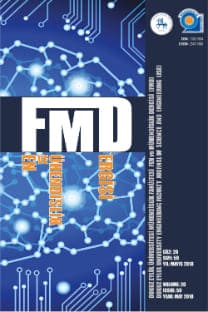GİRİT BÖLGESİNİN İZAFİ KABUK KALINLIĞI DEĞİŞİMİNİN MANYETİK VE SERBEST HAVA GRAVİTE ANOMALİLERİ İLE İRDELENMESİ
Girit yayı bölgesi Doğu Akdeniz’de aktif dalma-batma olgusunun devam ettiği Afrika ve Ege levhalarının etkileştiği bir bölgedir. Bu bağlamda Girit yayı Doğu Akdeniz tektoniğinin en karmaşık alanıdır. Bu yapıyı açıklamak için 230 00ı -280 00ı doğu boylamları ve 330 00ı -360 40ı kuzey enlemleri arasında kalan bölgenin serbest hava gravite ve manyetik anomalilerinden kabuk yapısı araştırılmıştır. Bu anomalilerin değerleri arasında kabuk kalınlıkları belirlenmesinde ters bir orantı mevcuttur. Dolayısıyla bu yaklaşım göreceli kabuk kalınlıkları hakkında genel bilgileri vermektedir. Girit adasının güney kısmında kabuk kalınlığı kuzeydekine göre daha fazla olduğu ve Ege Denizi içlerinde kabuk kalınlığının adanın güneyine göre daha ince olduğu hem gravite hem de manyetik anomalilerin ortak değerlendirilmesi ile ortaya konmuştur. Sonuç olarak bu uygulama özellikle göreceli kabuksal kalınlık değişiminin ilksel alan değerlendirmelerinde yardımcı olacaktır.
Anahtar Kelimeler:
Serbest Hava Gravite Anomalisi, Manyetik Anomali, Girit Yayı, Ege Denizi
INVESTIGATING OF RELATIVE CRUSTAL THICKNESSES VARIATION OF CRETAN REGION WITH MAGNETIC AND FREE AIR GRAVITY ANOMALIES
Cretan Arc area where the plates of Africa and Aegean converge, is an active subduction still undergoing. In this respect the Cretan Arc is one of the most complex within the Eastern Mediterranean tectonics. In order to explain this structure, the crustal structure of this area lying in the coordinates 230 00ı -280 00ı east longitudes and 330 00ı -360 40ı north latitudes was tried to be investigated with free-air gravity and magnetic anomalies. There is a reciprocal relationship between the anomalies for determining crustal thicknesses. Therefore this approach can give general information about relative crustal thicknesses. The crustal thickness are thicker in the south of the Island of Crete compared with its north and accordingly the crustal thickness get relatively thinner toward the inward of the Aegean Sea observed from the both gravity and magnetic anomalies.
Keywords:
Free Air Gravity Anomaly, Magnetic Anomaly, Cretan Arc, Aegean Sea,
___
- Benetatos C., Kiratzi A., Papazachos C. and Karakaisis G. (2004): “Focal mechanisms of shallow and intermediate depth earthquakes along the Hellenic Arc”, Journal of Geo Dynamics 37 pp:253-296.
- Brönner, M. (2003): “Untersuchung des Krustenaufbaus entlang des Mediterranen Rückens abgeleitet aus geophysikalischen Messungen. In: Berichte aus dem Zentrum für Meeres und Klimaforschung” Reihe C: Geophysik Nr. 21. Universitat Hamburg, p. 170.
- Bohnhoff, M.,Makris, J., Papanikolaou, D. and Stavrakakis, G. (2001): “Crustal investigation of the Hellenic subduction zone using wide aperture seismic data”, Tectonophysics 343 (3–4), 239–262.
- Casten, U., Snopek, K. (2006): “Gravity modelling of the Hellenic subduction zone—a regional study”, Tectonophysics 417 183–200.
- Delibasis, N., Ziazia, M., Voulgaris, N., Papadopoulos, T., Stavrakakis, G., Papanastassiou, D. and Drakatos, G. (1999): “Microseismic activity and seismotectonics of Heraklion area (central Crete Island, Greece).” Tectonophysics 308, 237–248.
- Payo, G. (1967): “Crustal structure of the Mediterranean sea by surface waves”, Part I. Group velocity. Bull. Seismol. Soc. Am., 57, 151-172.
- Snopek, K., Meier, T., Endrun, B., Bohnhoff, M. and Casten, U. (2007): “ Comparison of gravimetric and seismic constrains on the structure of the Aegean lithosphere in hthe forearc of the Hellenic subduction zone in the area of Crete”, Jourmal Of Geodynamics., 44- 173,187
- Stiros, S.C. (2000): “TheAD365 Crete earthquake and possible seismic clustering during the fourth to sixth centuriesADin the Eastern Mediterranean: a review of historical and archaeological data.” J. Struct. Geol. 23, 545–562.
- Taymaz, T., Jackson, J. and Westaway, R., (1990): “Earthquake mechanism in the Hellenic Trench near Crete”, Geophysical Journal International 102, 695– 731.
- Von Frese, R.R.B., W.J. Hinze and L.W. Braile, (1982). “Regional North American gravity and magnetic anomaly correlations”, Geophys. J.R. Astr. Soc., v. 69, pp. 745-761.
- Woodside, J. M. and Bowin, C. (1970): “Gravity anomalies and inferred crustal structures in eastern Mediterranean Sea”, Geol. Soc. Amer. Bull. 81, 1107.
- ISSN: 1302-9304
- Yayın Aralığı: Yılda 3 Sayı
- Başlangıç: 1999
- Yayıncı: Dokuz Eylül Üniversitesi Mühendislik Fakültesi
Sayıdaki Diğer Makaleler
KEMALPAŞA OVASININ ÜÇ BOYUTLU İNTERAKTİF HİDROJEOLOJİK MODELİ
Celalettin ŞİMŞEK, Zülfü DEMİRKIRAN, Levent ÇETİNER, Orhan GÜNDÜZ, Gökhan ÖCAL
ISPARTA YÖRESİNDE BULUNAN BAZI MAĞMATİK KÖKENLİ KAYAÇLARIN KESİLEBİLİRLİK ANALİZİ
Nazmi ŞENGÜN, Raşit ALTINDAĞ, C Erinç KOÇÇAZ
İZMİR-MENDERES POMZA CEVHERİNİN BAZI TÜR MERMERLERİN AŞINDIRILMASINDA ABRASİV OLARAK KULLANIMI
Ece Kılınç AKSAY, Ali AKAR, İlknur CÖCEN, Turgay ONARGAN
Tolga GÖNENÇ, Mustafa AKGÜN, Mustafa ERGÜN
GENETİK ALGORİTMA KULLANAN YAPAY BAĞIŞIK SİSTEM TABANLI ARIZA TEŞHİS MODELİ
